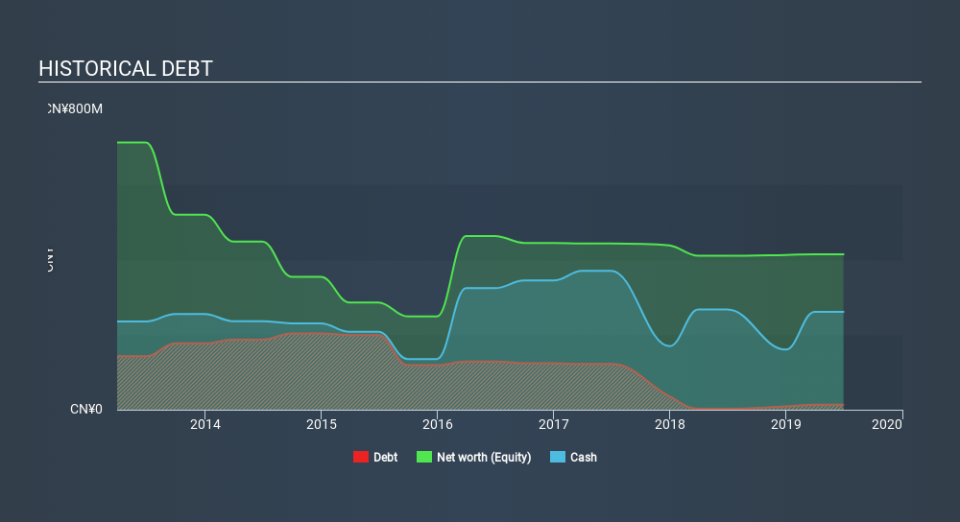Here's Why Shaw Brothers Holdings (HKG:953) Can Manage Its Debt Responsibly

Legendary fund manager Li Lu (who Charlie Munger backed) once said, 'The biggest investment risk is not the volatility of prices, but whether you will suffer a permanent loss of capital. When we think about how risky a company is, we always like to look at its use of debt, since debt overload can lead to ruin. We can see that Shaw Brothers Holdings Limited (HKG:953) does use debt in its business. But the real question is whether this debt is making the company risky.
Why Does Debt Bring Risk?
Debt assists a business until the business has trouble paying it off, either with new capital or with free cash flow. In the worst case scenario, a company can go bankrupt if it cannot pay its creditors. While that is not too common, we often do see indebted companies permanently diluting shareholders because lenders force them to raise capital at a distressed price. Of course, debt can be an important tool in businesses, particularly capital heavy businesses. When we think about a company's use of debt, we first look at cash and debt together.
Check out our latest analysis for Shaw Brothers Holdings
What Is Shaw Brothers Holdings's Debt?
The image below, which you can click on for greater detail, shows that at June 2019 Shaw Brothers Holdings had debt of CN¥13.2m, up from CN¥2.40m in one year. But on the other hand it also has CN¥260.8m in cash, leading to a CN¥247.6m net cash position.
How Strong Is Shaw Brothers Holdings's Balance Sheet?
According to the balance sheet data, Shaw Brothers Holdings had liabilities of CN¥150.0m due within 12 months, but no longer term liabilities. Offsetting this, it had CN¥260.8m in cash and CN¥78.2m in receivables that were due within 12 months. So it actually has CN¥189.0m more liquid assets than total liabilities.
This surplus liquidity suggests that Shaw Brothers Holdings's balance sheet could take a hit just as well as Homer Simpson's head can take a punch. Having regard to this fact, we think its balance sheet is just as strong as misogynists are weak. Succinctly put, Shaw Brothers Holdings boasts net cash, so it's fair to say it does not have a heavy debt load!
It is just as well that Shaw Brothers Holdings's load is not too heavy, because its EBIT was down 43% over the last year. Falling earnings (if the trend continues) could eventually make even modest debt quite risky. There's no doubt that we learn most about debt from the balance sheet. But it is Shaw Brothers Holdings's earnings that will influence how the balance sheet holds up in the future. So when considering debt, it's definitely worth looking at the earnings trend. Click here for an interactive snapshot.
Finally, a business needs free cash flow to pay off debt; accounting profits just don't cut it. Shaw Brothers Holdings may have net cash on the balance sheet, but it is still interesting to look at how well the business converts its earnings before interest and tax (EBIT) to free cash flow, because that will influence both its need for, and its capacity to manage debt. During the last two years, Shaw Brothers Holdings burned a lot of cash. While that may be a result of expenditure for growth, it does make the debt far more risky.
Summing up
While we empathize with investors who find debt concerning, you should keep in mind that Shaw Brothers Holdings has net cash of CN¥247.6m, as well as more liquid assets than liabilities. So we don't have any problem with Shaw Brothers Holdings's use of debt. When analysing debt levels, the balance sheet is the obvious place to start. However, not all investment risk resides within the balance sheet - far from it. For example, we've discovered 1 warning sign for Shaw Brothers Holdings that you should be aware of before investing here.
Of course, if you're the type of investor who prefers buying stocks without the burden of debt, then don't hesitate to discover our exclusive list of net cash growth stocks, today.
If you spot an error that warrants correction, please contact the editor at editorial-team@simplywallst.com. This article by Simply Wall St is general in nature. It does not constitute a recommendation to buy or sell any stock, and does not take account of your objectives, or your financial situation. Simply Wall St has no position in the stocks mentioned.
We aim to bring you long-term focused research analysis driven by fundamental data. Note that our analysis may not factor in the latest price-sensitive company announcements or qualitative material. Thank you for reading.



